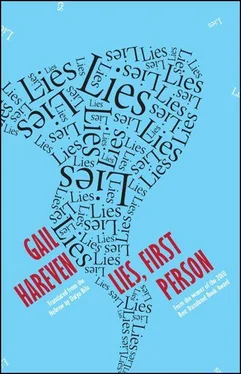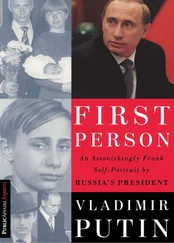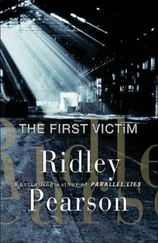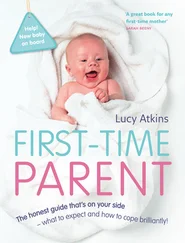There was a moment of silence. The talkative grandfather took out his wallet. The being disguised as a boring old grandfather opened his wallet, took out a little picture and held it out to the light: whether to look at it himself or to show to the others. The bodyguard sat still as a statue, the hand retreated and withdrew the picture.
“Fathers and sons. .” The voice sighed. “You too, so I hear, have sons. They must be grown up now. .”
“Elinor. .” said my husband, the perfect gentleman, opening the door for me.
“I have a question,” I croaked. And immediately my throat cleared and the continuation flowed as if of its own accord: “I have a question, which is actually the reason we asked you to come. I wanted to know: how many women have you actually raped?” I hadn’t planned this question. The way things turned out, I didn’t plan anything.
A hand reached for the table, picked up a purple pastel crayon and rubbed it between its fingers. A hand spotted with freckles like that of an old man turned upward and balanced the crayon on its palm. A hand that was not that of an old man gave itself away and didn’t tremble. The orange lighting illuminated a steady hand weighing a purple pastel crayon in its palm.
When it began to answer, the voice was as steady as the hand and the chatty tone was gone.
He appreciated my directness, and more than that, he thanked me for it. They said that directness was a characteristic of native born Israelis. Some saw this characteristic as indicative of a lack of culture and sophistication, but he thought otherwise. He remembered that even as a young girl I was very direct: in my speech and especially in my eyes, a very particular look I had in my eyes.
His difficulty in answering my question was related to the presumption of guilt it contained. There was a lawyer sitting with us, and he would no doubt confirm that such a startling question belonged to the stage when the so-called criminal had already admitted his guilt and the counts of the charge were being negotiated. We weren’t children, and it was clear to us all that the only direct answer he could give would make it impossible to continue this conversation. Speaking for himself, he would be sorry, since the reason he had contacted me a few weeks ago was that he was eager for a chance to do something else. When my charming husband had invited him to come up here, he imagined that I — with every right — was going to ask him for explanations for all kinds of troubling questions, such as for example why the relations between my father and himself had been broken off. In this as in other matters he did not see himself as free of guilt, certainly not, human life by its very nature involved guilt. But things were complicated, very complicated, and they could on no account be summed up in the shallow medium called “an admission.” He had been told that Elinor wrote a literary column for the newspaper, and as someone close to literature she had surely taken note of the fact that while there was a literary genre of confession, there was no genre of “admission.” The admissions extorted by the police in the course of their interrogations never amounted to a text worth anything.
He was a professor, the habits of a lifetime were hard to uproot, and therefore we would allow him to further remark that questions to which the answers were “yes” or “no” would accomplish nothing in furthering the understandings of any one of us. Did Stalin have signs that the Germans were about to invade? Yes. Were there Jews in key positions in Stalin’s terror apparatus? Yes indeed. The problem is that this “yes” does not really enrich our understanding, and it will not help us to prevent any tragedies in the future.
As he had mentioned in his presentation, which he was very grateful to us for being kind enough to attend, the great human question is “why?” and to this “why?” there are not, and cannot be short two- or three-letter answers.
In any event, it saddened him greatly to think that two wonderful young people like us, two of his own relations, should regard him as a hardened criminal. He wasn’t complaining, he understood that in the light of our partial information perhaps it was impossible for us to come to a different conclusion, but he had not yet lost hope of trying to correct our impression.
Did the name Hannah Arendt mean anything to us? If so, perhaps it would interest us to know that she wrote that the Eichmann trial was an indescribably low and repulsive event. Whatever we thought of him — the voice smirked — he wasn’t Eichmann, and none of us would gain anything by holding a show trial for him here in this courtyard.
•
The shadowy profile of the mask turned toward Oded. Even when he was addressing me he avoided turning his face to me. Perhaps he thought that the debate should be conducted with the man, and perhaps it was one of his parodies of politeness: not to look a woman in the eye in the presence of her husband.
So the head was turned to Oded. One spidery leg was crossed on the other. One sharp knee rose above the table. A dark wave of gray hair crested over a huge head. The hand that had weighed the pastel crayon came to a satisfactory conclusion and returned it to its jar. And the voice that had fallen silent in order to assess our silence saw it as confirmation and continued into the enclosed space of the courtyard:
If we were ready to do without the show trial and listen to him, he would like to tell us about a certain text, a novel, in fact, which he had been working on for over two years now. It could be argued that after the mistake of Hitler, First Person he should have abandoned literary writing, he understood this argument, but sometimes, and there were a number of examples of this, great achievements grew precisely out of what on the face of it seemed a failure, out of the strange joy that seized hold of a man when his back was to the wall.
In any case, it was about this novel that he wanted to talk to us when he tried to make contact with us that time. We were family, and as such it was important to him to clarify certain things with us before the book came out. And since he was going to be in Israel anyway he thought that he would take advantage of the opportunity.
As we may have already guessed, his novel contained certain biographical elements, but it was on no account an autobiography or a roman à clef in the usual sense. That is to say, it did not present events as they had happened, or seek to portray real people in disguise. In the words of the poet, the best of the poem is its fabrication, and the same holds true for prose. While the book enlarged upon issues he had already touched on in his essay, “My Mistake,” it was important to understand that it was basically a work of fiction, and should be read as such.
Reducing a work of literature to its plot was doing it an injustice. In time to come perhaps we would do him the honor of wishing to read his book, but in order for this happen he had no option but to do himself and his book this very injustice, if we would have the patience to listen.
The plot takes place in the present day. The hero, whose name is Albert, is the French cultural attaché in Phnom Penh, a far from simple challenge considering the history of France in the country. But this, of course, is something the average Western reader knows nothing about. He himself, who knew a little history, had to do a lot of reading in order to create a convincing factual foundation for his novel. The research, by the way, was highly instructive, but this was a matter for another conversation. He didn’t want to digress too far from the subject. Up to now we had shown extraordinary patience, which he appreciated very much, and he had no wish to impose upon it any further.
Читать дальше












